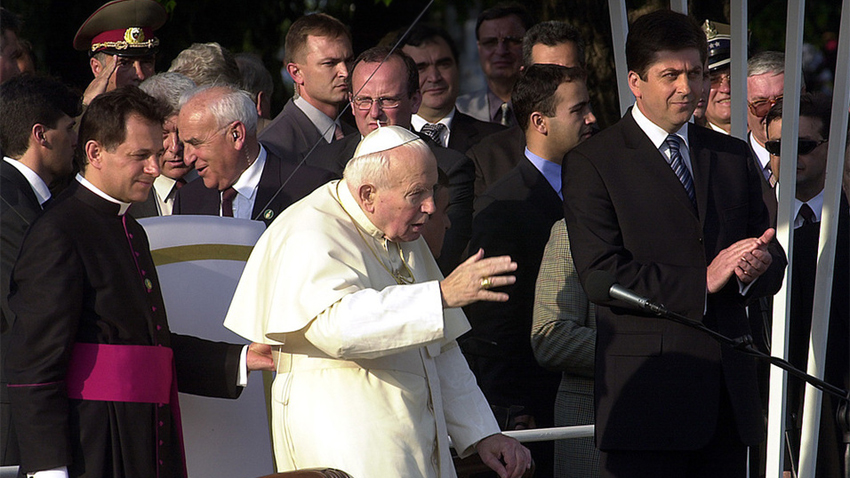As Roman Pontiff, Pope John Paul II paid over 100 visits in different parts of the world. He was the first Pope to have been inside a synagogue, a mosque and a protestant church, sending out an important message to the public, a message of tolerance among religions as well as in inter-state relations.
The visit by Pope John Paul II to Bulgaria in May 2002 was an event of paramount importance to the country, whose reputation had been severely tarnished, especially in the Catholic world, by a provocation from the time of the Cold War, when Bulgarian nationals and Bulgaria’s name were embroiled in the attempt on the life of Pope John Paul II. On 13 May 1981, the Pope was shot and wounded in St. Peter’s square by Mehmet Ali Agca, member of the Turkish nationalist organization the Grey Wolves.
This is the reason why even after diplomatic relations between Bulgaria and the Holy See were restored in 1991, it was vital to Bulgaria that Pope John Paul II accept the invitation and pay a visit to the country. In 2001, a national committee organized a nationwide campaign, collecting over 20,000 invitations by Bulgarians to send to the Pope. On 12 May 2002, when Foreign Minister Solomon Passy paid a visit to the Holy See, the Pope made a statement the Bulgarian nation had been waiting to hear: “My visit to your country shall aim to encourage the Catholic brothers and sisters in their faith and make their dearest wish come true – that of consolidating the relations between the Catholic Church and the Bulgarian Orthodox Church.”
 Officially, the visit took place at the invitation of the Catholic Church in Bulgaria and the Bulgarian state. On 23 May, on the eve of the day of Sts. Cyril and Methodius, day of the Slavonic alphabet, Bulgarian enlightenment and culture, Pope John Paul II set foot on Bulgarian soil. The Bulgarian National Radio Golden Fund audio archives have kept the address he made in the Bulgarian language, upon his arrival in Sofia:
Officially, the visit took place at the invitation of the Catholic Church in Bulgaria and the Bulgarian state. On 23 May, on the eve of the day of Sts. Cyril and Methodius, day of the Slavonic alphabet, Bulgarian enlightenment and culture, Pope John Paul II set foot on Bulgarian soil. The Bulgarian National Radio Golden Fund audio archives have kept the address he made in the Bulgarian language, upon his arrival in Sofia:
“Your Holiness, honourable members of the diplomatic corps, esteemed representatives of the official authorities, esteemed representatives of different religious denominations, dear brothers and sisters, with much emotion and deep joy I come to Bulgaria today and extend my heartfelt greetings to you. I am grateful to the Almighty God for having bestowed upon me the honour of having my wish come true, a wish I have long carried in my heart.”
Over three days from 23 to 26 May, the Pope held numerous meetings with government officials, as well as with intellectuals and thousands of ordinary people who came out to greet him in Sofia and in Plovdiv. Here is how prominent Bulgarian writer Yordan Radichkov greeted him:
“Your Holiness, your visit to Bulgaria is a great honour for us. It coincides with the most highly treasured and spiritual day for us – the day of the holy brothers Cyril and Methodius, of the Slavonic alphabet, of Bulgarian culture. Your Holiness, you accorded us another great honour when you declared Sts. Cyril and Methodius patron saints of Europe. We, small nations are like small children – we delight in any small courtesy we are accorded by big nations. Hubris and hauteur are things unknown to us, perhaps because we have not conquered other nations. Finally, allow me, Your Holiness to bow down to you and to warmly bid you welcome on Bulgarian soil. Our land is but small in territory, yet our heart is big and there is room in it for any man sent by God.”
The visit was emblematic also because of Pope John Paul II’s words during his meeting with President Georgi Purvanov: “I have never believed in the so-called “Bulgarian connection” in the attempt on my life. That was an insinuation, an injustice.”
With these words, the Pope exonerated the Bulgarians Sergey Antonov, Zhelyu Vassilev and Todor Aivazov, falsely accused by Ali Agca of having ordered the assassination of the Pope. Vassilev and Aivazov were in Bulgaria when investigating magistrate Ilario Martella issued a warrant for their arrest. Sergey Antonov, however, was in Rome where he was arrested, an investigation was launched and he was handed over to an Italian court. Despite the unbelievable publicity, the evidence gathered by Martella did not stand up in court and the defendants were acquitted.
English version: Milena Daynova
He was the most handsome pianist of his time. Elegant, proud and unreachable, he looked as if he was born with a tailcoat in Sofia in 1929. This is how Berlin newspaper "Die Welt" described Alexis Weissenberg. Born in Sofia, the..
“I believe that even talented playwright Stanislav Stratiev who wrote the role in the emblematic movie Band With No Name especially for Velko Kunev, would have found it hard to find words of solace if he were here with us now. Velko..
„What is happening around the world, concerns us, and the more we turn a blind eye to that it concerns us, the more we get encaged in our domestic problems and narrow our horizon, the more inadequate we become in making..

+359 2 9336 661
